The Role of Omega-3s in Sleep Quality
🌙 Introduction: Why Sleep Quality Matters More Than Sleep Quantity
We’ve all experienced it — eight hours in bed but waking up feeling like we didn’t sleep at all. 😴
That’s because sleep quality — not just duration — determines how rested, focused, and emotionally balanced we feel.
Deep, restorative sleep depends on more than bedtime habits. It’s also shaped by brain chemistry, hormone regulation, and cellular health — all of which are profoundly influenced by Omega-3 fatty acids.
These healthy fats, found in fish oil and certain plant sources, play a critical role in everything from brain function and mood regulation to inflammation control.
But what’s often overlooked is how deeply Omega-3s are connected to sleep regulation — through their effects on neurotransmitters, melatonin production, and even the structure of brain cells themselves.
In this in-depth guide, we’ll explore:
🧠 How Omega-3s affect brain and sleep chemistry
🌿 The difference between DHA and EPA for sleep
💤 What science says about Omega-3s improving rest
🍣 How to optimize your diet or supplement routine for better sleep
Let’s uncover how these essential fats help you sleep deeper, recover faster, and wake up brighter.
Looking for supplements for This? Click here.
🧬 Part 1: What Are Omega-3 Fatty Acids?
Omega-3s are a family of polyunsaturated fatty acids (PUFAs) — healthy fats that the body can’t produce on its own. They must come from food or supplements.
The three most important Omega-3s are:
ALA (Alpha-linolenic acid) – Found in flaxseed, chia, and walnuts 🌰
EPA (Eicosapentaenoic acid) – Found in fatty fish 🐟
DHA (Docosahexaenoic acid) – Found in fatty fish and algae 🌊
While ALA is beneficial, it’s inefficiently converted into EPA and DHA — the two forms that most directly affect brain health and sleep.
That’s why marine or algae-based Omega-3s are considered the most effective sources.
🧠 Part 2: How Omega-3s Affect the Brain and Sleep

⚙️ 1️⃣ Supporting Brain Cell Structure
DHA is a major structural component of the neuronal membrane — the outer layer of brain cells that transmits electrical signals.
Healthy membranes allow neurotransmitters (like serotonin and GABA) to move smoothly between cells, which is crucial for calmness and relaxation before sleep.
When DHA is low, membranes become rigid, disrupting communication between neurons.
💡 In short: DHA keeps your brain flexible — literally and figuratively — making it easier to transition into restful states.
🌙 2️⃣ Boosting Melatonin and Serotonin Production
Omega-3s, especially DHA, play a key role in the synthesis of serotonin, the “feel-good” neurotransmitter that also serves as a precursor to melatonin — your sleep hormone.
Serotonin helps regulate mood and relaxation during the day.
Melatonin converts from serotonin at night to control sleep-wake rhythms.
If your Omega-3 intake is low, serotonin receptors can become less responsive, and melatonin levels may decline — making it harder to fall asleep or stay asleep.
Studies show that people with higher blood levels of DHA and EPA tend to have better melatonin profiles and more stable sleep patterns.
🧘 3️⃣ Calming the Nervous System
Omega-3s modulate the autonomic nervous system, which controls stress responses.
They reduce sympathetic (fight-or-flight) activity.
They increase parasympathetic (rest-and-digest) tone.
That means your body can shift into relaxation faster at night, lowering heart rate and cortisol (the stress hormone) that often spikes before bed.
EPA, in particular, has been shown to reduce anxiety and irritability, helping the mind stay quiet when it’s time to rest.
🔥 4️⃣ Reducing Inflammation That Disrupts Sleep
Inflammation is one of the hidden enemies of deep sleep.
High levels of inflammatory cytokines (like IL-6 or TNF-alpha) can interfere with the brain’s ability to regulate sleep stages.
Omega-3s act as natural anti-inflammatories, reducing these molecules and promoting better slow-wave sleep (deep sleep) — where physical repair and immune restoration occur.
💤 Chronic inflammation = fragmented, shallow sleep
💪 Balanced inflammation = longer, deeper rest
💓 5️⃣ Balancing Heart and Respiratory Rhythms
EPA and DHA influence the heart rate variability (HRV) — a marker of how well your body can switch between stress and recovery.
A higher HRV is associated with better sleep resilience and adaptability to stress.
Omega-3s improve HRV by making cardiac cells more responsive to parasympathetic control.
Translation: they help your body “relax on command.”
Looking for supplements for This? Click here.
🔬 Part 3: What the Research Says
Here’s what science reveals about Omega-3s and sleep quality:
🧒 1️⃣ DHA and Sleep in Children
A 2014 study at the University of Oxford found that children with higher DHA levels slept nearly an hour longer and woke up less frequently at night.
When supplemented with 600 mg of DHA daily, their sleep efficiency improved significantly compared to the placebo group.
😴 2️⃣ Adults with Low Omega-3 Status
Low blood DHA has been linked to shorter sleep duration and more nighttime awakenings in adults.
A study published in Nutrition Reviews showed that adults with higher DHA levels reported fewer symptoms of insomnia and better mood upon waking.
🧓 3️⃣ Older Adults and Sleep Maintenance
A 2017 review found that Omega-3 supplementation improved sleep latency (time to fall asleep) and REM sleep stability in older adults — particularly those with inflammation or mood disorders.
🧬 4️⃣ Mood, Stress, and Sleep
Because Omega-3s modulate serotonin and cortisol, they also reduce stress-induced insomnia.
A meta-analysis in Frontiers in Psychiatry found that EPA-rich formulas significantly lowered anxiety, which in turn improved sleep continuity.
💭 5️⃣ ADHD and Restless Sleep
In children with ADHD — a condition often associated with Omega-3 deficiency — supplementation improved sleep onset and nighttime calmness.
That’s likely due to Omega-3’s role in dopamine and serotonin balance, which helps regulate both focus and relaxation cycles.
🩵 Part 4: EPA vs. DHA — Which Omega-3 Matters Most for Sleep?
Both EPA and DHA are essential, but they play slightly different roles:
| Fatty Acid | Function | Best For |
|---|---|---|
| DHA | Brain structure, melatonin synthesis, sleep architecture | Falling asleep and staying asleep |
| EPA | Mood, inflammation, cortisol balance | Relaxation and daytime calm |
For deep sleep, DHA appears to have the stronger influence — but EPA enhances the relaxation and anti-inflammatory benefits that help you get there.
💡 Optimal sleep support usually comes from combined EPA+DHA formulas (at least 2:1 ratio of EPA:DHA).
🍣 Part 5: How to Get Enough Omega-3s
🐟 1️⃣ Best Food Sources
Salmon
Sardines
Mackerel
Anchovies
Trout
Herring
Plant sources (ALA): flaxseeds, chia seeds, hemp seeds, walnuts — though less efficiently converted.
Aim for 2–3 servings of fatty fish per week or supplementation if dietary intake is low.
💊 2️⃣ Supplementation
Recommended daily intake:
General wellness: 1000 mg combined EPA + DHA
For sleep or inflammation: 2000–3000 mg combined
Forms:
Triglyceride (TG) or re-esterified TG form for best absorption
Enteric-coated capsules to avoid fishy burps
Algae oil for plant-based DHA
⚠️ 3️⃣ Safety and Side Effects
Omega-3s are very safe when taken within recommended limits.
Possible mild effects:
Soft stools
Mild fishy aftertaste
Slight thinning of blood (avoid very high doses before surgery)
Always check with your doctor if taking blood thinners or anti-inflammatory medications.
🌿 Part 6: Stacking Omega-3s With Other Sleep Nutrients

To maximize results, combine Omega-3s with other calming, sleep-supportive compounds:
🌙 1️⃣ Magnesium
Calms the nervous system and supports melatonin synthesis.
Works synergistically with DHA to reduce nighttime muscle tension.
🍵 2️⃣ L-Theanine
Promotes alpha brain waves for relaxed focus.
Complements Omega-3’s stress-reducing effects.
🪶 3️⃣ Glycine
Lowers body temperature and supports deeper slow-wave sleep.
Works beautifully with Omega-3s for overall rest quality.
🌾 4️⃣ Ashwagandha
Lowers cortisol and helps the body adapt to time zone or stress changes.
Combined with Omega-3s, it enhances resilience and recovery.
🍒 5️⃣ Tart Cherry Extract
Contains natural melatonin and antioxidants.
Omega-3s + tart cherry = reduced inflammation + improved circadian rhythm.
Looking for supplements for This? Click here.
🧘 Part 7: Daily Routine for Sleep Support with Omega-3s
| Time | Action | Why It Works |
|---|---|---|
| Morning | Take Omega-3 supplement with breakfast | Enhances serotonin and focus |
| Afternoon | Stay hydrated, avoid excess caffeine | Prevents cortisol spikes |
| Evening | Light dinner with protein + Omega-3 foods (salmon, avocado) | Provides DHA for melatonin synthesis |
| 1 hour before bed | Magnesium or glycine tea | Activates GABAergic calm |
| Bedtime | Dim lights, no screens | Supports natural melatonin rise |
🧩 Part 8: Signs Your Sleep Is Improving
After 2–4 weeks of consistent Omega-3 intake, you may notice:
✅ Falling asleep faster
✅ Fewer nighttime awakenings
✅ Vivid, stable dreaming (REM regulation)
✅ More energy and mood stability in the morning
✅ Calmer evenings with reduced racing thoughts
These changes reflect improved neurotransmitter function and inflammation balance — both central to sleep health.
🌈 Part 9: Omega-3 Deficiency and Sleep Disorders
Low Omega-3 status has been associated with:
Insomnia and fragmented sleep
Restless leg syndrome
Sleep apnea severity (due to inflammation and vascular stiffness)
Depressive symptoms that worsen nighttime rumination
Deficiency disrupts the brain’s phospholipid membrane composition, reducing serotonin and melatonin signaling efficiency.
Replenishing DHA and EPA helps restore neurochemical flexibility — allowing sleep signals to travel smoothly again.
💬 Part 10: Real-World Stories
“After taking a high-quality fish oil for a month, I noticed I didn’t toss and turn anymore. My dreams were clearer, and I felt actually rested in the morning.”
— Sophie, 34, wellness coach
“I travel often for work, and Omega-3s helped me beat jet lag faster. My sleep schedule stabilizes in days now.”
— Daniel, 41, entrepreneur
“Pairing fish oil with magnesium and glycine finally gave me uninterrupted sleep after years of stress-related insomnia.”
— Marina, 37, yoga instructor
🌠 Final Thoughts: Nourishing the Night Through the Brain
Omega-3s aren’t magic pills — they’re foundational nutrients for nervous system balance, emotional calm, and hormonal regulation.
By restoring cell membrane health, reducing inflammation, and supporting serotonin-melatonin pathways, they help your body remember how to rest deeply.
Good sleep is a biological rhythm — not a luxury.
And Omega-3s are the oils that keep that rhythm flowing smoothly.
Sleep well, think clearly, and rise renewed. 🌙💤
Looking for online therapy ? Click Here.
📚 References
Montgomery, P. et al. “Fatty Acids and Sleep in Children.” Journal of Sleep Research, 2014.
Tan, M. et al. “Omega-3 Fatty Acids and Sleep Quality in Adults.” Nutrition Reviews, 2016.
Peuhkuri, K. et al. “Diet and Sleep: The Role of Nutrients.” Nutrients, 2012.
Strandberg, T. et al. “Serum DHA and Sleep Quality in Older Adults.” Sleep Medicine, 2017.
Rainey-Smith, S. et al. “Omega-3 Supplementation and Cognitive Function.” Frontiers in Aging Neuroscience, 2018.
Larrieu, T. et al. “Anti-inflammatory Role of Omega-3s on Sleep and Stress.” Frontiers in Physiology, 2020.
Sarris, J. et al. “Nutritional and Herbal Sleep Aids.” Phytotherapy Research, 2020.
Walker, M. Why We Sleep. Scribner, 2017.
Hibbeln, J. R. “Fish Consumption and Sleep Quality.” American Journal of Clinical Nutrition, 2015.
Huberman, A. “Nutrition and Circadian Rhythms.” Huberman Lab Podcast, 2023.
Related Posts
-

Post-Traumatic Growth and Supplements That Support It
After trauma, true healing means more than survival — it’s transformation. Learn how post-traumatic growth happens in the brain and body, and explore natural supplements like magnesium, ashwagandha, saffron, and omega-3s that support resilience, clarity, and emotional repair.
-

How to Regain Focus After Emotional Stress
After emotional stress, your nervous system feels frayed — your focus fades, thoughts race, and calm seems impossible. Learn how to restore balance, rebuild concentration, and retrain your brain for clarity and peace through evidence-based mind–body tools. 🌿
-

The Future of Sleep Supplements
The future of sleep supplements is here — where science meets nature. Discover how next-generation formulas use adaptogens, amino acids, and biotech innovations to support deep, restorative sleep without dependency. 🌙
-
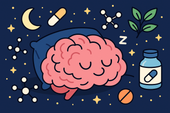
Emerging Research on Sleep and Nootropics
Can nootropics help you sleep better? Discover how compounds like L-theanine, magnesium threonate, ashwagandha, and Alpha-GPC influence neurotransmitters, circadian rhythm, and brain recovery — bridging the gap between smarter days and deeper nights. 🌙
-

New Herbal Extracts for Deep Sleep
Discover the next generation of herbal extracts for deep sleep — from saffron and magnolia to jujube and lemon balm. Learn how these plant-based compounds calm the nervous system, balance cortisol, and promote truly restorative rest. 🌙
-
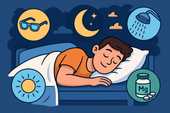
Sleep Biohacking: What Works and What Doesn’t
Biohacking your sleep can sound futuristic — from red light therapy to wearables and supplement stacks. But which hacks actually help, and which are just hype? Discover the science-backed sleep strategies that truly improve rest, recovery, and brain health. 🌙
-
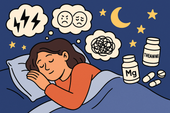
Sleep Support for People with Anxiety Disorders
💭 A restless mind can keep you up all night — thoughts spinning, heart racing, and peace feeling far away. Learn how to quiet overthinking, regulate your nervous system, and create a nightly ritual that teaches your brain to let go and rest deeply. 🌙
-
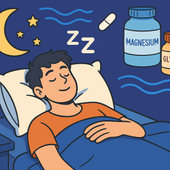
How to Fall Back Asleep After Waking Up
Waking up in the middle of the night? Learn how to fall back asleep quickly and calmly using breathing techniques, stress-reducing rituals, and natural supplements like magnesium and glycine. Restore your body’s rhythm and wake up feeling refreshed.
-
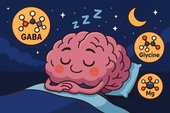
Stacking GABA and Glycine for Deeper Rest
Discover how stacking GABA and glycine can help you achieve deeper, more restorative sleep. Learn how these calming amino acids work together to relax your mind, soothe your body, and improve overall sleep quality—naturally and safely.
-

Overcoming Jet Lag with Supplements
✈️ Jet lag doesn’t have to ruin your trip! Discover how supplements like melatonin, magnesium, L-theanine, and tart cherry can help you reset your body clock faster, reduce fatigue, and recover energy naturally after long flights. 🌙
-

Managing Sleep During Times of Stress
Feeling wired and restless? Learn how to manage sleep during stressful times through nutrition, breathwork, and natural supplements like magnesium and L-theanine. Discover how to calm your nervous system and restore deep, peaceful rest—even when life feels overwhelming.
-

The Role of Magnesium for Night Cramps
Night cramps keeping you awake? Discover how magnesium helps relax muscles, balance electrolytes, and prevent painful spasms. Learn which forms work best, how to take them, and how to pair them with other nutrients for cramp-free, peaceful sleep.
-

Supplements That Reduce Nighttime Awakenings
🌙 Discover science-backed supplements that help you stay asleep through the night. From magnesium and L-theanine to glycine and ashwagandha, learn how these natural compounds calm your nervous system, balance cortisol, and prevent 2 a.m. wake-ups for deeper, more restorative rest.
-

Nootropics That Promote Calm and Rest
Explore the world of calming nootropics — natural brain enhancers that promote relaxation, better focus, and deeper rest. Learn how L-Theanine, magnesium, ashwagandha, and other adaptogens help balance your nervous system, reduce stress, and support restorative sleep.
-

Best Natural Supplement Stack for Sleep
Discover the best natural supplement stack for deep, restorative sleep. Learn how nutrients like magnesium, L-theanine, glycine, and calming herbs such as chamomile and ashwagandha work together to relax your body, calm your mind, and improve sleep quality—naturally and safely.
-

Combining L-Theanine and Magnesium for Sleep: A Calm Night, Naturally
Discover how combining L-Theanine and Magnesium can help you drift into deep, restorative sleep. Learn how this natural duo calms the mind, relaxes the body, and supports your nervous system—without grogginess the next morning.
-

How to Sleep Better After Intense Workouts
Struggling to fall asleep after a tough workout? Learn how to optimize your post-training recovery with nutrition, hydration, and science-backed sleep strategies. Discover how to calm your nervous system, balance hormones, and wake up fully recharged for your next session.
-

Ashwagandha and Valerian: A Bedtime Combo for Deep Rest and Emotional Reset
Discover the calming synergy of Ashwagandha and Valerian root, two natural sleep aids that help quiet the mind, ease anxiety, and promote deeper rest. Learn how this herbal duo supports the nervous system, balances stress hormones, and restores emotional peace — without next-day grogginess.
-

How to Create a Resilience-Boosting Diet
Discover how to build emotional and physical strength from the inside out with a resilience-boosting diet 🍎. Learn which foods stabilize your mood, how supplements like magnesium and omega-3s strengthen your stress response, and why pairing nutrition with breathwork and therapy creates lasting calm, focus, and vitality 🌿💪.
-

Best Teas and Herbal Blends for Calmness: Nature’s Way to Restore Inner Peace
Ashwagandha, the ancient adaptogenic herb, helps your body find balance during stress. Known as “Indian ginseng,” it supports cortisol regulation, boosts energy, and restores calm clarity. Discover how this powerful root promotes resilience, emotional balance, and steady vitality — one cup at a time. 🌸
-

Parenting and Emotional Strength: How to Raise Children Without Losing Yourself
Empathy is the bridge that connects hearts — the quiet power to understand, feel, and support another’s emotions without judgment. Learn how empathy strengthens relationships, enhances communication, and cultivates deeper compassion in everyday life. 🌿
-

How to Bounce Back from Public Failure: Reclaiming Confidence, Purpose, and Power
Visualization is more than imagination — it’s brain training for resilience. By picturing calm, success, or healing, you activate the same neural pathways as real experience. Learn how daily visualization rewires your brain for confidence, emotional balance, and recovery from stress. ✨
-

Coping with Financial Stress Through Resilience: How to Stay Grounded When Money Feels Tight
Body awareness is the foundation of emotional resilience. By tuning into your body’s signals — tension, fatigue, or calm — you learn to recognize stress before it overwhelms you. Discover how mindfulness, gentle movement, and breathwork can deepen your connection with your body and restore balance from the inside out. 🧘
-

How to Stay Positive During Chronic Illness: A Guide to Emotional Strength and Hope
Creativity is more than art — it’s a form of healing. Whether through painting, writing, music, or small acts of expression, creativity helps release emotion, calm the nervous system, and reconnect you to joy. Discover how to use creativity as a tool for emotional balance, resilience, and self-discovery. 🌿
-

Resilience Tips for Caregivers: How to Stay Strong While Caring for Others
Joy isn’t the absence of pain — it’s the quiet strength to find light even in challenging times. Cultivating joy through small daily moments restores balance, releases stress, and reminds you of life’s beauty. Learn how to reconnect with authentic happiness, rebuild emotional energy, and nurture your nervous system through gratitude, presence, and play. 🌿
-

Building Resilience After a Breakup: How to Heal, Rebuild, and Rise Stronger
Social connection is one of the strongest predictors of emotional resilience. During difficult times, genuine relationships act as anchors — calming the nervous system, reducing stress hormones, and helping you regain perspective. Learn how cultivating real human connection can strengthen your mind, heart, and overall well-being. 🌿
-

How to Stay Emotionally Strong During Job Loss
Your emotions are powered by brain chemistry — a delicate balance of neurotransmitters like serotonin, dopamine, and cortisol. When these chemicals work in harmony, you feel calm, focused, and resilient. Learn how daily habits, nutrition, and mindfulness can support your brain chemistry and boost emotional well-being naturally. 🌿
-

The Role of Hormones in Emotional Stability: How Your Chemistry Shapes Your Calm
Hormones shape more than your body — they shape your emotions, resilience, and sense of calm. From cortisol to serotonin, these chemical messengers influence how you react to stress, connect with others, and recover from challenges. Learn how to balance your hormones naturally to build lasting emotional stability and harmony within. 💫
-

Mitochondria and Emotional Energy: The Cellular Power Behind Your Mood
Breathwork is one of the most powerful tools for emotional regulation and cellular balance. Through intentional breathing, you can calm your nervous system, increase oxygen flow to the brain, and even support mitochondrial energy. Learn how conscious breathing connects body and mind — transforming stress into presence and emotional strength. 🌿
-

Inflammation and Its Impact on Mood Resilience: The Silent Link Between Body and Mind
Inflammation doesn’t just affect the body — it impacts the mind. Chronic inflammation alters brain chemistry, depletes serotonin, and makes emotional recovery harder. Learn how calming inflammation through nutrition, mindfulness, and sleep can restore balance, resilience, and a renewed sense of emotional strength. 💫
-

How Antioxidants Protect Emotional Well-being: The Hidden Link Between Oxidative Stress and Mental Health
Antioxidants do more than protect your body — they defend your mind. By neutralizing oxidative stress, antioxidants support serotonin, dopamine, and brain energy pathways that keep you calm, focused, and emotionally balanced. Discover how foods like berries, green tea, and dark chocolate nourish your brain, boost mood, and strengthen resilience from the inside out. 🌿✨
-

The HPA Axis and Emotional Health: The Hidden Bridge Between Stress and Mind
Neuroplasticity — the brain’s ability to rewire and adapt — is the foundation of emotional healing and resilience. When you face stress, trauma, or change, your neural pathways can reshape themselves to support new patterns of calm, focus, and self-awareness. Learn how daily practices like mindfulness, therapy, and breathwork strengthen neuroplasticity to transform emotional pain into personal growth. 🌸
-

Why Cortisol Control Is Key to Resilience: Mastering Stress to Build Emotional Strength
Controlling cortisol — the body’s main stress hormone — is the secret to lasting resilience. When cortisol levels stay balanced, your mind becomes clearer, emotions steadier, and energy more sustainable. Learn how breathwork, mindset shifts, adaptogens, and daily rhythms can help you calm your stress response and build true inner strength. 🌞💪
-

Dopamine’s Influence on Motivation and Recovery: Reigniting Drive and Balance
Healthy relationships are the foundation of emotional balance and resilience. Whether romantic, familial, or platonic, genuine connection releases dopamine, serotonin, and oxytocin — the brain’s “bonding trio” — helping us feel secure, motivated, and seen. Learn how trust, empathy, and communication not only strengthen your connections but also reshape your nervous system for deeper emotional well-being. 🌿🤝
-

The Role of Serotonin in Resilience: How This “Mood Molecule” Shapes Emotional Strength
Serotonin — often called the “resilience molecule” — plays a vital role in how we handle stress, regulate mood, and recover from emotional challenges. Beyond happiness, this powerful neurotransmitter helps balance the gut-brain axis, stabilize the nervous system, and support emotional flexibility. Learn how nutrition, sunlight, mindfulness, and adaptogens can naturally boost serotonin and strengthen your emotional resilience. 🌞🧠
-

How Neuroplasticity Supports Emotional Growth: Rewiring the Brain for Resilience
Neuroplasticity is the brain’s built-in power to grow, adapt, and heal — and it’s the foundation of emotional transformation. Every mindful breath, compassionate act, or reframed thought strengthens new neural pathways that support resilience and self-awareness. Learn how your brain rewires through daily habits, helping you turn emotional challenges into opportunities for growth and calm. 🌿
-

Tai Chi and Adaptogens for Mind-Body Balance: The Art of Harmonizing Energy and Resilience
Alchemy isn’t just an ancient science — it’s a timeless symbol of transformation and inner balance. By blending the physical and spiritual, alchemy teaches us that change begins from within. Just as metals are refined into gold, we too can transmute emotional pain, stress, and chaos into clarity and strength through mindful practice and self-awareness. 🌙✨
-

Cold Therapy and Emotional Control: Training the Mind Through the Body
Cold therapy isn’t just for athletes — it’s a tool for emotional mastery. By exposing your body to controlled cold, you train your nervous system to stay calm under stress, improving focus, mood, and resilience. This article explores the science of cold exposure, its impact on hormones and the vagus nerve, and how ice baths and cold showers can help you build emotional control, one breath at a time. 🧊🧘♂️
-

How Music Influences Emotional Recovery: The Healing Soundtrack of the Mind
Neuroplasticity — the brain’s ability to rewire and heal itself — is at the heart of emotional recovery. Through mindful habits, music, therapy, and consistent mental stimulation, your brain can form new connections that support resilience and well-being. Discover how neuroplasticity turns pain into growth, helping you rebuild balance, focus, and emotional strength. 🌿
-

Nature Therapy for Building Resilience: Reconnecting With the Healing Power of the Earth
Nature therapy helps rebuild emotional resilience by reconnecting you with the healing rhythms of the Earth. From forest walks to sunlight exposure, nature restores balance to your nervous system, lowers stress hormones, and teaches emotional adaptability. Learn how spending time outdoors can enhance mental clarity, calm anxiety, and awaken your natural capacity to heal. 🌞
-

Breathwork Techniques That Pair with Supplements: The Ultimate Synergy for Stress Relief and Mental Clarity
Breathwork and supplements create a powerful mind-body synergy for stress relief, focus, and energy. By combining intentional breathing with adaptogens, nootropics, and calming nutrients, you can naturally regulate cortisol, sharpen mental clarity, and boost emotional balance. This guide explores the best breathwork techniques and supplement pairings to help you feel centered, calm, and energized from the inside out. 🌿
-

Why Cortisol Balance Matters for Emotional Strength
Balancing cortisol — your body’s main stress hormone — is essential for emotional resilience. When cortisol is chronically high, your mind stays stuck in survival mode, leading to fatigue, anxiety, and emotional instability. This article explores how nutrition, supplements, breathwork, and therapy can help restore healthy cortisol rhythms, regulate the nervous system, and strengthen your ability to handle life’s challenges with calm focus and emotional strength. 🌿
-

Best Supplements for Students During Exam Season: Focus, Energy, and Memory Support
Studying late into the night? Learn which natural supplements can boost focus, memory, and mental stamina during exam season — without the crash. From omega-3s to Bacopa and Rhodiola, discover your brain’s ultimate exam support stack. 🎓🧠
-

Natural Memory Boosters for Seniors: How to Keep Your Mind Sharp and Focused
Stay mentally sharp and confident as you age. Discover science-backed natural supplements and lifestyle habits that boost memory, focus, and brain longevity for seniors. 🌿🧠
-

The Link Between Stress, Cortisol, and Memory Loss
Chronic stress can quietly erode your memory — and cortisol is the key culprit. Learn how stress hormones affect the brain, why the hippocampus shrinks under pressure, and how natural strategies can help you restore memory and mental clarity. 🧠✨
-

How to Build a Daily Supplement Routine for Memory Health
Want to sharpen your memory and stay mentally clear? Learn how to build a daily supplement routine for memory health — from morning focus to nighttime brain repair. Discover science-backed nutrients that boost recall, focus, and long-term cognitive resilience. 🧠🌿
-

Top 5 Natural Supplements for Memory Recall and Focus
Looking to boost memory and concentration naturally? Discover the top 5 supplements — Bacopa, Ginkgo Biloba, Lion’s Mane, Rhodiola, and Phosphatidylserine — that enhance focus, recall, and long-term brain health. 🧠✨
-

Top Supplements to Balance Mood Naturally
From omega-3s to adaptogens, discover the top natural supplements proven to support emotional balance, reduce stress, and promote inner calm — safely and effectively. 🌿✨
-

Can Omega-3 Fatty Acids Help with Mood Disorders?
Omega-3 fatty acids do more than support heart health — they can help balance mood, reduce depression, and calm anxiety. Discover how EPA and DHA nourish your brain, fight inflammation, and support emotional well-being from within. 🌊🧠

















































